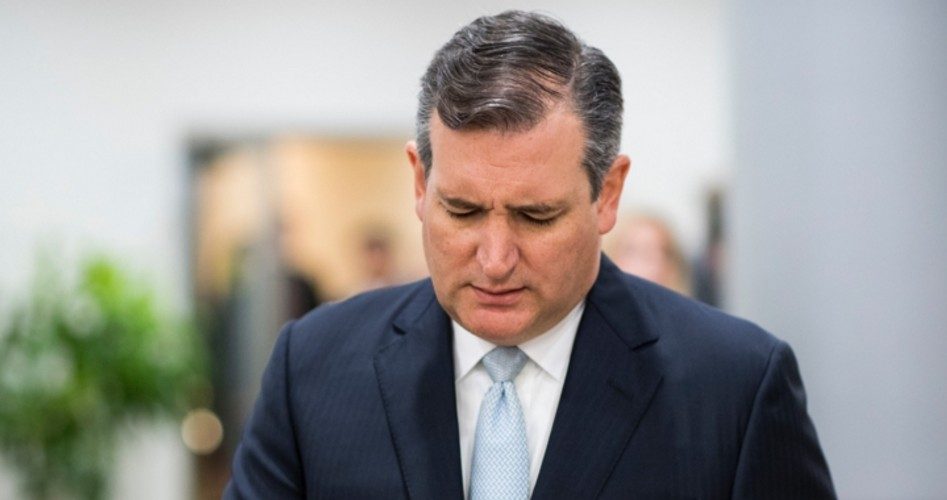
Writing in his book A Time for Truth, Senator Ted Cruz (R-Texas) told readers that he had “worked hard to protect U.S. sovereignty, a deep passion of mine ever since we prevailed over the UN and the World Court in Medillin v. Texas.” Cruz was referencing his role as solicitor general in Texas, when he successfully opposed the George W. Bush administration’s efforts to force Texas to bend to the will of the United Nations on a death-penalty case.
But his recent strong support for his country’s continued membership in NAFTA contradicts his “passion” to protect America’s national sovereignty.
Just last week, Cruz spoke to the U.S. Chamber of Commerce, delivering a strong endorsement of the trade agreement adopted in 1994. While he allowed that he believed NAFTA needed some improvements, he cautioned that termination of the deal would “impose massive costs on Texas and the United States.”
“Texas farmers, Texas ranchers, Texas manufacturers, Texas small businesses do well when we have access to foreign markets,” Cruz argued. He encouraged “more voices” to push the Trump administration “in the direction of expanding international trade and opening up foreign markets.”
Cruz is the third-highest scoring senator on the “Freedom Index” of The New American magazine, trailing only Senators Rand Paul of Kentucky and Mike Lee of Utah. (The “Freedom Index” rates members of Congress on their fidelity to the principles of the U.S. Constitution). He took a courageous stand when running for president last year when he opposed ethanol subsidies in the Republican presidential contest in the Iowa caucuses (of 17 Republican candidates, he and Paul were the only two who favored the free market in that case). Constitutional conservatives would agree with most of his public policy positions.
But not this one.
Note that Cruz does not discuss the ramifications of the NAFTA deal on U.S. sovereignty, despite his stated “passion” on preserving our nation’s independence. Instead, he placed his support for the trade deal on its supposed economic benefits for Americans.
Cruz, who often speaks of liberty, should consider what Art Thompson, the CEO of the John Birch Society (the parent organization of The New American) recently said, in discussing multilateral trade agreements, NAFTA in particular: “It is not jobs, but liberty, that is more important.”
One of the problems with these “free trade agreements” is that they are actually “managed trade.” Instead of creating conditions for actual free trade in goods and services, NAFTA created a multinational government bureaucracy designed to manage and control North American trade between the three signatories — the United States, Mexico, and Canada.
In cases of disputes as to the interpretation of the treaty, it would not be U.S. courts that would adjudicate, but rather multinational bodies created by the agreement. This means that decisions routinely made by a sovereign nations and sovereign states would instead be made by bodies staffed by Mexican and Canadian, as well as American, bureaucrats.
The late Robert Pastor, professor of International Relations at American University, had long advocated the economic integration of North America. In his book Toward a North American Community: Lessons From the Old World for the New, Pastor made it very clear he wanted even less sovereignty for America than now: “What’s wrong with NAFTA is not what it did, but what it omitted.” He advocated a “compelling vision to define a modern regional entity.”
Then, in an article in 2004 for Foreign Affairs (the publication of the globalist Council on Foreign Relations), Pastor explained that he viewed NAFTA as “merely the first draft of an economic constitution for North America.” In other words, Pastor advocated a North American Union (NAU), modeled on the pattern established by the European Union (EU), the super-state regional government which presently is dictating policies to formerly sovereign nations in Europe.
Pastor’s book title, Toward a North American Community: Lessons From the Old World for the New, should give us pause. One of the “lessons” we can take from the “Old World” is the growth of the European Union from a supposedly benign “free trade” agreement in coal and steel to the modern multinational government of the EU. The EU does not just adjudicate “trade” issues, but attempts to impose upon its member states laws that have nothing to do with trade, in areas such as immigration and social policy.
This situation became so intolerable that the people of the United Kingdom voted to get out of the EU — the “Brexit.” That is a lesson from the Old World that we should take to heart, and it is a lesson that Senator Cruz should study closely, as well. His constituents in Texas should also contact him with their concerns.
Rather than attempting to “improve” or “modernize” NAFTA, if we value our national sovereignty, we should simply follow the course of the Brits — and get out now.
Photo: AP Images



